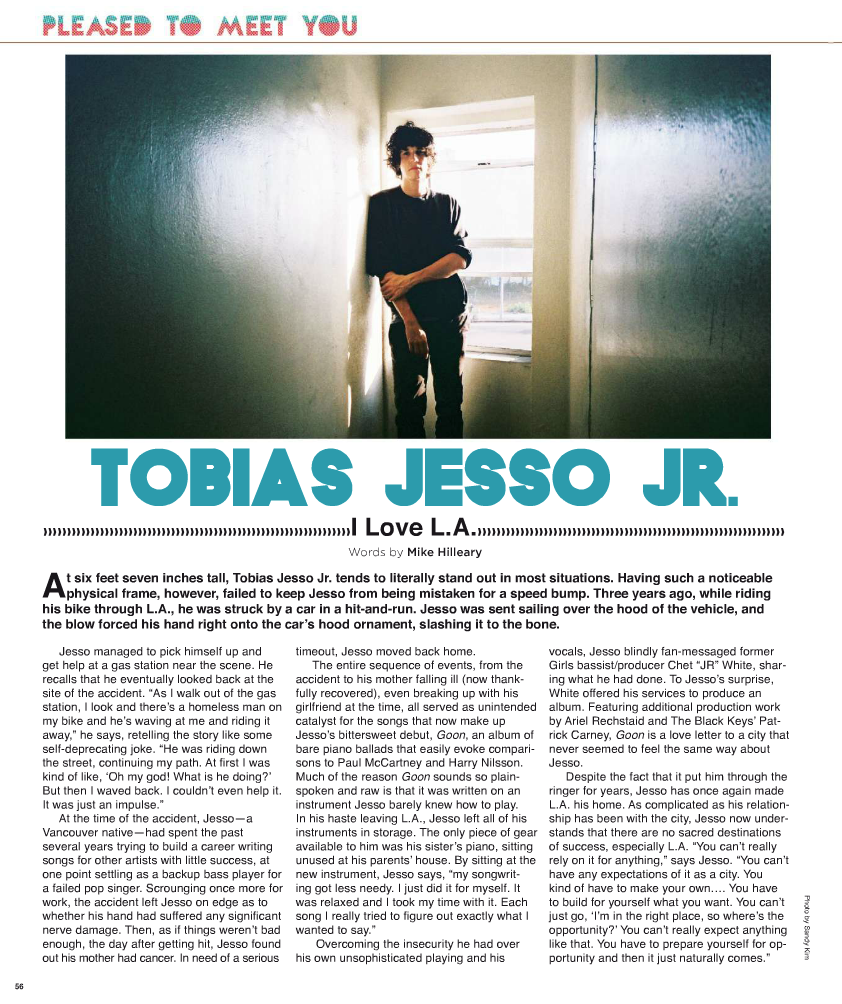Under the Radar, Issue 53
At six feet seven inches tall, Tobias Jesso Jr. tends to literally stand out in most situations. Having such a noticeable physical frame, however, failed to keep Jesso from being mistaken for a speed bump. Three years ago, while riding his bike through L.A., he was struck by a car in a hit-and-run. Jesso was sent sailing over the hood of the vehicle, and the blow forced his hand right onto the car's hood ornament, slashing it to the bone.
Jesso managed to pick himself up and get help at a gas station near the scene. He recalls that he eventually looked back at the site of the accident. "As I walk out of the gas station, I look and there's a homeless man on my bike and he's waving at me and riding it away," he says, retelling the story like some self-deprecating joke. "He was riding down the street, continuing my path. At first I was kind of like, 'Oh my god! What is he doing?' But then I waved back. I couldn't even help it. It was just an impulse."
At the time of the accident, Jesso—a Vancouver native—had spent the past several years trying to build a career writing songs for other artists with little success, at one point settling as a backup bass player for a failed pop singer. Scrounging once more for work, the accident left Jesso on edge as to whether his hand had suffered any significant nerve damage. Then, as if things weren't bad enough, the day after getting hit, Jesso found out his mother had cancer. In need of a serious timeout, Jesso moved back home.
The entire sequence of events, from the accident to his mother falling ill (now thankfully recovered), even breaking up with his girlfriend at the time, all served as unintended catalyst for the songs that now make up Jesso's bittersweet debut, Goon, an album of bare piano ballads that easily evoke comparisons to Paul McCartney and Harry Nilsson. Much of the reason Goon sounds so plainspoken and raw is that it was written on an instrument Jesso barely knew how to play. In his haste leaving L.A., Jesso left all of his instruments in storage. The only piece of gear available to him was his sister's piano, sitting unused at his parents' house. By sitting at the new instrument, Jesso says, "my songwriting got less needy. I just did it for myself. It was relaxed and I took my time with it. Each song I really tried to figure out exactly what I wanted to say."
Overcoming the insecurity he had over his own unsophisticated playing and his vocals, Jesso blindly fan-messaged former Girls bassist/producer Chet "JR" White, sharing what he had done. To Jesso's surprise, White offered his services to produce an album. Featuring additional production work by Ariel Rechstaid and The Black Keys' Patrick Carney, Goon is a love letter to a city that never seemed to feel the same way about Jesso.
Despite the fact that it put him through the ringer for years, Jesso has once again made L.A. his home. As complicated as his relationship has been with the city, Jesso now understands that there are no sacred destinations of success, especially L.A. "You can't really rely on it for anything," says Jesso. "You can't have any expectations of it as a city. You kind of have to make your own.... You have to build for yourself what you want. You can't just go, 'I'm in the right place, so where's the opportunity?' You can't really expect anything like that. You have to prepare yourself for opportunity and then it just naturally comes."

